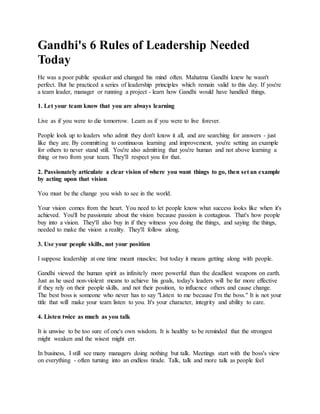Gandhi's brand of leadership
- 1. Gandhi's 6 Rules of Leadership Needed Today He was a poor public speaker and changed his mind often. Mahatma Gandhi knew he wasn't perfect. But he practiced a series of leadership principles which remain valid to this day. If you're a team leader, manager or running a project - learn how Gandhi would have handled things. 1. Let your team know that you are always learning Live as if you were to die tomorrow. Learn as if you were to live forever. People look up to leaders who admit they don't know it all, and are searching for answers - just like they are. By committing to continuous learning and improvement, you're setting an example for others to never stand still. You're also admitting that you're human and not above learning a thing or two from your team. They'll respect you for that. 2. Passionately articulate a clear vision of where you want things to go, then set an example by acting upon that vision You must be the change you wish to see in the world. Your vision comes from the heart. You need to let people know what success looks like when it's achieved. You'll be passionate about the vision because passion is contagious. That's how people buy into a vision. They'll also buy in if they witness you doing the things, and saying the things, needed to make the vision a reality. They'll follow along. 3. Use your people skills, not your position I suppose leadership at one time meant muscles; but today it means getting along with people. Gandhi viewed the human spirit as infinitely more powerful than the deadliest weapons on earth. Just as he used non-violent means to achieve his goals, today's leaders will be far more effective if they rely on their people skills, and not their position, to influence others and cause change. The best boss is someone who never has to say "Listen to me because I'm the boss." It is not your title that will make your team listen to you. It's your character, integrity and ability to care. 4. Listen twice as much as you talk It is unwise to be too sure of one's own wisdom. It is healthy to be reminded that the strongest might weaken and the wisest might err. In business, I still see many managers doing nothing but talk. Meetings start with the boss's view on everything - often turning into an endless tirade. Talk, talk and more talk as people feel
- 2. helpless and tune out. In one-on-one meetings, these managers occasionally ask what you think, cut you off, and then keep going as though you said nothing. A real leader spends most of her or his time listening - to the concerns of the team, their views, ideas and problems. Build a reputation for listening. Listen twice as much as you talk (for we have 2 ears and 1 mouth). You'll be amazed at how much more influential that is, compared to talk, talk and more talk. 5. Get rid of the serious face Service which is rendered without joy helps neither the servant nor the served. But all other pleasures and possessions pale into nothingness before service which is rendered in a spirit of joy. Too many of us take ourselves way too seriously. Gandhi was not afraid to be human. In daily business life, put on a smile and be hopeful, but most importantly, be yourself - and not some fake person who is pretending to be important. The effective leader is authentic. 6. Make the "doing" of work interesting and meaningful Satisfaction lies in the effort, not in the attainment, full effort is full victory. One of the biggest challenges of anyone running a team is to make the work meaningful, fun and interesting. Even the most menial tasks can be more engaging if you turn work into a game. Set targets with rewards. Explain the "why" of work so people can connect what they're doing with the final result. They need to know that they are important - and what they are doing is contributing to the common good. The Gandhi brand of leadership - with its quiet persuasion - is needed now more than ever. _____________________________________________ The Real Gandhi? Viewed as a saint and perfect leader the world over, Gandhi was also human, with all the imperfections and contradictions that entails. The legacy of Gandhi in his home country of India is one which is not without controversy and mixed feelings. The public Gandhi and the private Gandhi were not necessarily one in the same. Some who knew him said he was vain (which Gandhi agreed with, admitting his human shortcomings). Others viewed him as racist. Still others saw him as naive. However history will ultimately judge him, there is no doubt that Gandhi's brand of persuasive leadership is worthy of emulating.


